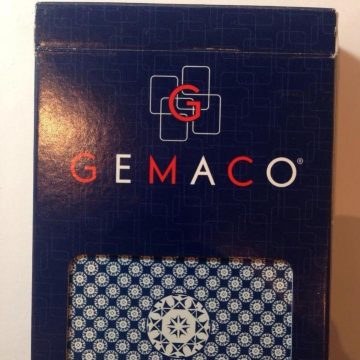
Borgata is suing Gemaco, the playing card manufacturer behind the Phil Ivey edge-sorting scandal at Borgata and Crockfords Casino. Borgata won a $10.1 million judgment against Phil Ivey and Kelly Sun, but it now wants a similar payout from Gemaco.
In 2012, Hall of Fame poker professional Phil Ivey and edge-sorting expert Kelly Sun played in high-roller sessions of mini-baccarat at Borgata in Atlantic City and Crockfords in London. In both cases, Ivey asked for a variety of concessions from the casino staff in exchange for playing high-stakes baccarat.
Ivey and Sun asked for a baccarat dealer who spoke Mandarin Chinese and the right to tell the dealer how to sort the cards. The dealer was told to rotate certain cards 180 degrees, for the sake of “superstition”.
Purple Gemaco Playing Cards
Also, the two asked to use a set of purple Gemaco playing cards. Sun could spot the 2-through-cards and situate them 180 degrees different than the other cards, so they had a general idea the rank of the next card in the game. In return, they agreed to play at Borgata for $50,000-a-hand ($100,000-a-hand in later sessions).
What Borgata’s management did not know what there were irregularities on the back of the purple Gemaco playing cards. Kelly Sun had the ability to spot those irregularities. With the ability to sort the cards, Ivey and Sun could wager on baccarat at an advantage. They had a positive expectation, allowing them to win millions of dollars.
Borgata Baccarat Sessions
The two played a number of baccarat sessions at Borgata from May to August 2012. After winning around $3 million at $50,000-a-hand, Borgata lured Ivey back in August with promises of $100,000-a-hand baccarat. Sure enough, he won even more money, eventually collecting $9.6 million from the Atlantic City casino.
Phil Ivey Sued Crockfords
Phil Ivey might have gotten away with the Borgata sessions, but the plan did not go as well at Crockfords Casino in London. He won £7.2 million at Crockfords, but the casino staff refused to pay him his winnings. They determined he was edge-sorting or otherwise gaining an undue advantage. Instead of walking away from the situation, Phil Ivey sued for his £7.2 million.
The lawsuit alerted Borgata to what happened in Ivey’s games at their casino, so they sued to get their $9.6 million back. In fact, Borgata sued for $15 million, claiming they wanted his winnings, plus what he would have been expected to lose in a normal baccarat session. A New Jersey district judge refused to pay Borgata potential damages, but did require Ivey to pay $10.1 million — Ivey’s winnings, plus the comps on his casino markers.
Borgata Lawsuit Asks for $10.1 from Gemaco
Now Borgata wants Gemaco to pay the same amount. Observers might see the second lawsuit as greed, but Borgata probably is hedging its bets against a loss of the Phil Ivey decision on appeals. Though the Ivey-Borgata case ended in October 2016 and Ivey hasn’t appealed the decision yet, the Crockfords case might cause Phil Ivey and his lawyers to launch an appeal.
Last month, the UK Supreme Court heard arguments in Phil Ivey’s appeal of the Crockfords decision. The original case went against him in 2014, while he lost an appeal in 2016. If Phil Ivey wins before the UK Supreme Court, then he might launch an appellate battle against Borgata.
Gemaco Playing Card Company
Gemaco Playing Card Co. produces poker cards, precious dice, casino furniture, table accessories, RFID products, and casino chips. Since 2014, Gemaco is a subsidiary of Gaming Partners International (GPI), which has manufacturing facilities in North America, Europe, and Asia. GPI also owns brands like Paulson, B&G, and Bud Jones. All-in-all, GPI has over 750 employees worldwide.
George C. Matteson Jr. founded Gemaco Playing Cards in 1965 in Kansas City, Missouri. Matteson graduated from the Wharton School of Business at the University of Pennsylvania. WHen he retturned to Kansas City after college, he entered his family’s business and created the Gemaco brand. The “G” and “E” in the name come from the first two letters of George, while the “M” and “A” come from the first two letters of the name Matteson. “Co” obviously refers to the word “company”.
Gemaco began marketing promotional products, but entered the casino industry in 1982. George Matteson retired from Gemaco in 1994 at the age of 65 and died in 2011.















